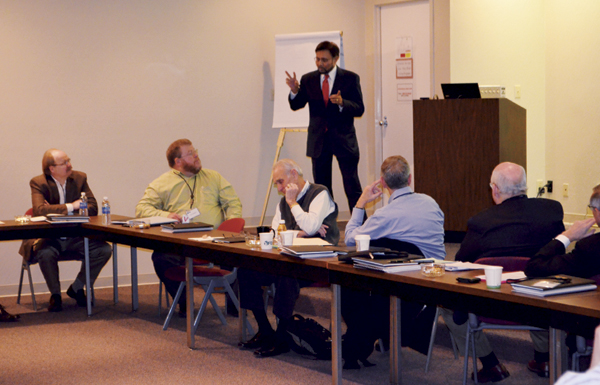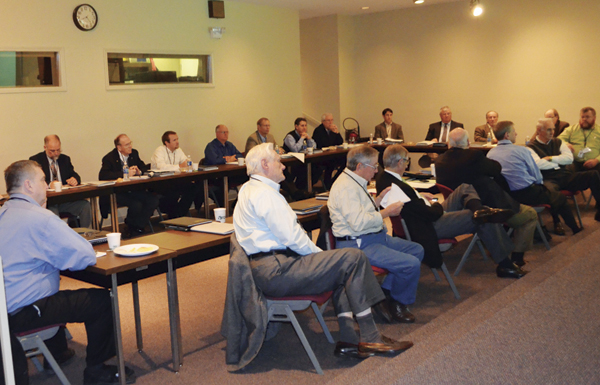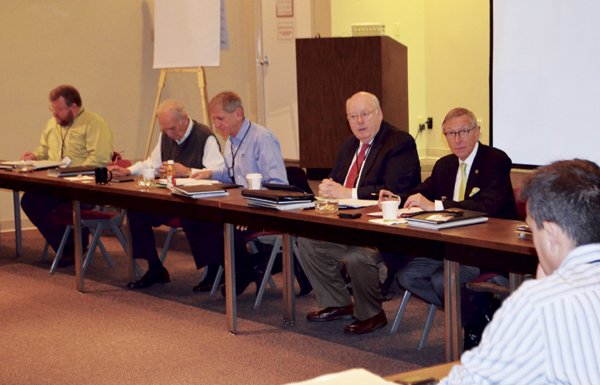
Dr. Amit Roy, IFDC president and CEO, discusses the USAID-funded Virtual Fertilizer Research Center (VFRC) and the industry’s necessary role in fertilizer research and development.
February 21, 2012 – MUSCLE SHOALS, Alabama, United States – The Fertilizer Industry Round Table (FIRT), a forum for industry leaders from across the supply chain to share best practices, innovations and market trends, held its annual board of directors meeting February 14 at IFDC’s headquarters in Muscle Shoals, Alabama.
The board, consisting of 37 members and chaired by William O’Neill, Jr. of International Raw Materials Ltd. (IRM), is comprised of both established and emerging companies with research and production interests in the fertilizer industry. Among them are Honeywell, J. R. Simplot, Mosaic Company, Potash Corp and Shell Sulphur Solutions. The research community is represented on the board by such organizations as IFDC, the International Fertilizer Industry Association (IFA), OISC Purdue University, The Sulphur Institute (TSI) and The Fertilizer Institute (TFI).
“This is a unique organization that truly cuts across all disciplines in the fertilizer sector, which is what makes it so interesting,” said Luc Maene, director-general of IFA, referring to the fertilizer manufacturers, distributors, researchers and advocacy organizations that make up FIRT’s membership.
When asked about the biggest challenges facing the industry, Maene stated, “To feed 9.4 billion people by 2050, we know the fertilizer industry needs to help generate higher agricultural productivity. The industry has a big role to play in working with the world’s growers to promote best management practices using existing fertilizer products. But the industry should also participate in the research and development of the fertilizers of the future that will respond to the seeds of the future.” (Maene’s reference was to enhanced seed varieties that continue to be modified to produce higher yields and to be more resistant to adverse climatic and environmental conditions.)
These two major points – the efficient use of existing fertilizer and the development of new fertilizer technologies – appear to be common topics of industry conversation, and both subjects were covered equally by board members during the meeting.
“All of the organizations involved in FIRT recognize the importance of making the efficient use of existing fertilizer technologies a priority,” said John Shields of IFDC’s Research and Development Division. “Critical to this effort is educating the various actors in the value chain – suppliers, agro-dealers and farmers – in improved nutrient and crop management practices. This is a particularly important effort in the developing world.”
Shields also shared thoughts on future technological advancements that echoed Maene’s statement. “It is also important that these stakeholders be made aware of new and promising technologies on the horizon,” Shields said.
The subject of new fertilizer technologies was highlighted by Dr. Amit Roy, president and CEO of IFDC, who gave a presentation on the progress of the Virtual Fertilizer Research Center (VFRC) for the FIRT board. The Center is designed to bring together scientists from all disciplines in fertilizer, seed and agro-economic research in a virtual setting, to more efficiently partner in common research goals. The Center is aligned with the fertilizer industry’s continuing efforts to develop new fertilizer technologies, and is expected to fast-track the most promising research into development.
“Fertilizers contribute 40-60 percent yield increases when properly applied to crops, but the current products are not necessarily the most efficient. For example, the loss of nitrogen from urea, the most widely used nitrogen fertilizer, ranges from 45-75 percent,” said Roy. “A new generation of more efficient fertilizers is needed to meet both current and future food production challenges. The VFRC is singularly positioned to connect the best minds in the rapid development of these new products.”
The cornerstone of FIRT is its general membership meeting to be held in November, presented in partnership with TFI. The annual meeting is designed to review best practices and processes across a wide range of fertilizer, agricultural and environmental topics. These proceedings are published annually, creating a permanent record of developments in the world fertilizer industry.
Background on FIRT
FIRT was established informally in 1951 during an annual American Chemical Society conference. Dissatisfied with the level of attention given to the subject of fertilizer and related issues, a number of industry leaders elected to gather separately to discuss common production issues and share best practices. Among these founders was Travis P. Hignett of the Tennessee Valley Authority, who later served as a special consultant to IFDC for more than a decade.
This level of knowledge sharing was considered revolutionary in the fertilizer industry. Before that time, companies within the industry were well-known for keeping their operations private, particularly their fertilizer formulations. This new era of transparency, led by FIRT, ultimately proved beneficial for the entire industry, improving the production, quality, distribution and efficient use of fertilizer materials.
Unique among fertilizer industry associations, FIRT receives no funding from vested companies or governments. The organization is run by volunteers who represent all aspects of the industry. They include executives, scientists, manufacturers, financial experts and industry analysts.
(Note: A list of the FIRT board members who attended the meeting as well as additional photos can be found below.)
###
IFDC Contacts:
Courtney Greene
+1 (256)-381-6600, ext. 357
Scott Mall
+1 (256)-381-6600, ext. 234
FIRT Board Members Attending February Meeting
Frank Achorn, SE-ME
John Boyd, Sr., Morral Companies
Vernon Carlton, Winston Weaver Co.
Mike Daigle, Mosaic Company
Donald Day, Day’s Consulting
David Downey, Purdue University
Charles Formisani, A.J. Sackett & Sons, Co.
Harvey Goertz, Innovative Hort Solutions, LLC
Kenneth Kunz, Honeywell
Shane Le Capitaine, FEECO International Inc.
Luc Maene, International Fertilizer Industry Association
Tim Mahoney, International Raw Materials (IRM)
Robert McNaughton, Sylvite Agri Services
Donald Messick, The Sulphur Institute
William O’Neill, Jr., International Raw Materials (IRM)
Dan Partin, ArrMaz Custom Chemicals, Inc.
Jim Samuelson, J.R. Simplot
John Shields, IFDC
Joseph Slater, Association of American Plant Food Control Officials (AAPFCO)
Larry Taylor, A.J. Sackett & Sons, Co.
Jeffrey Walker, ArrMaz Custom Chemicals, Inc.
Richard Whitesell, The Andersons
Additional Photos:

More than 20 industry professionals representing fertilizer manufacturing, distribution and research attended the annual FIRT Board Meeting.

Board Chairman William O'Neill Jr. of International Raw Materials Ltd. (IRM) (center, red tie) conducts FIRT business. To his left is Luc Maene, director-general of the International Fertilizer Industry Association (IFA).

